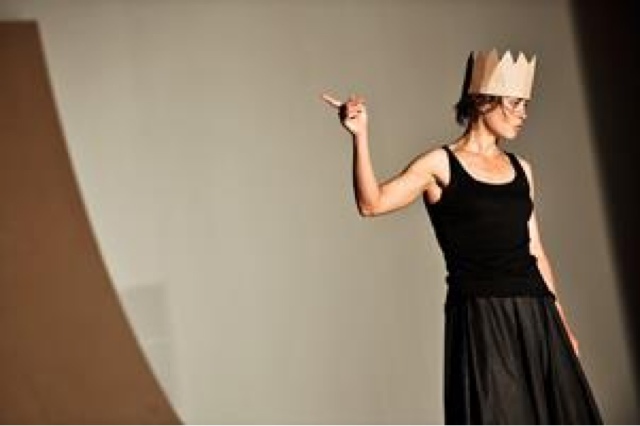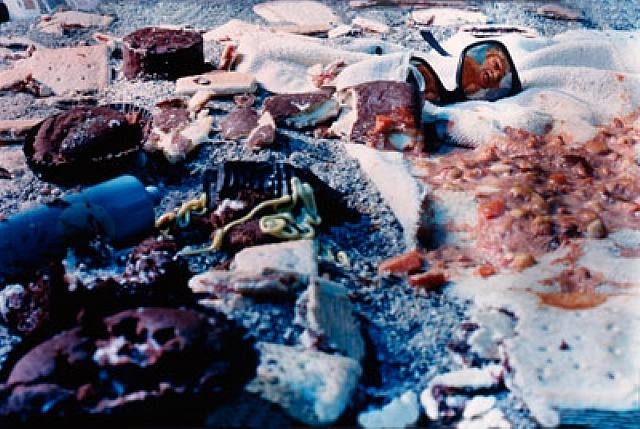The manic nature of this winter-spring has caused a full halt on my blog. Not for lack of things to write about, but rather for lack of time for sleep, much less writing.
Since we last saw our intrepid explorer, she has kept herself busy.
My collaboration with selardi for Tonight at Eight O'Clock was a resounding success; we sold out (over sold in fact...shhh!!) and had around 70 audience members experience the piece, what one of our volunteers described as "confused transcendence". It was truly an experiment, and in many ways, our goal of pushing the envelope of what audiences in Winnipeg will attend was a huge success. In fact, I think we under-estimated the audience's willingness to play along, and could have offered more. I'm continuing to think about this experiment in the dialectic relationship between audience and performer, art and viewer as I am creating and refining my ideas on the subject.
The next major project was as Assistant Director for Clever Little Lies at MTC; an entirely different experience, working with (extremely) professional actors on a new "straight" play. For many this may seem like a departure from my usual interests, however the play dove in head first in to some of the ideas that rest at the very core of all my work; the relationship between our reality and our expectations, and what we do to cope with that gap. In the contemporary world, we have been sold lifestyles and ideas about ourselves, and crafted images, and this play was yet another outlet to investigate how this can be damaging to our relationships. It was a fantastic experience working under Steven Schipper, and I had so many opportunities to learn how to drive the car, so to speak, in what a fellow local performer described as "NASA". Truly the MTC MainStage has all the big toys, and the freedom to create in this milieu was unparalleled.
Also, a version of the dissertation paper I wrote for my final work Approaching Antigone at RADA has been published by the Humanities Education Research Association! You can see it here. After all the yammering on this blog about Antigone, I'm sure you'll enjoy (or at least feel resolution). More to come on that project as I intend to resurface work on it in late 2015.
What now? Well I've got a few projects on the go. First up is the next instalment of my experiments with the audience performer relationship -- popART: Project Vapour. This takes a different form than the previous, returning to an installation style work that although does not fit the traditional definition of theatre (EG having a story and actors) I do believe is highly theatrical. The theatrical experience, however, is played out for the viewers of the piece.
Come see for yourselves if you like -- June 14 in the alley behind Artspace (Arthur Street, Exchange district, Winnipeg). More details here.
Will share more in the coming weeks about the new play I'm directing for the Fringe, as well as a very large scale adaptation project I'm working on. Hint: I have spent a lot of time recently reading about Plantagenet Kings.
Since we last saw our intrepid explorer, she has kept herself busy.
My collaboration with selardi for Tonight at Eight O'Clock was a resounding success; we sold out (over sold in fact...shhh!!) and had around 70 audience members experience the piece, what one of our volunteers described as "confused transcendence". It was truly an experiment, and in many ways, our goal of pushing the envelope of what audiences in Winnipeg will attend was a huge success. In fact, I think we under-estimated the audience's willingness to play along, and could have offered more. I'm continuing to think about this experiment in the dialectic relationship between audience and performer, art and viewer as I am creating and refining my ideas on the subject.
The next major project was as Assistant Director for Clever Little Lies at MTC; an entirely different experience, working with (extremely) professional actors on a new "straight" play. For many this may seem like a departure from my usual interests, however the play dove in head first in to some of the ideas that rest at the very core of all my work; the relationship between our reality and our expectations, and what we do to cope with that gap. In the contemporary world, we have been sold lifestyles and ideas about ourselves, and crafted images, and this play was yet another outlet to investigate how this can be damaging to our relationships. It was a fantastic experience working under Steven Schipper, and I had so many opportunities to learn how to drive the car, so to speak, in what a fellow local performer described as "NASA". Truly the MTC MainStage has all the big toys, and the freedom to create in this milieu was unparalleled.
Also, a version of the dissertation paper I wrote for my final work Approaching Antigone at RADA has been published by the Humanities Education Research Association! You can see it here. After all the yammering on this blog about Antigone, I'm sure you'll enjoy (or at least feel resolution). More to come on that project as I intend to resurface work on it in late 2015.
What now? Well I've got a few projects on the go. First up is the next instalment of my experiments with the audience performer relationship -- popART: Project Vapour. This takes a different form than the previous, returning to an installation style work that although does not fit the traditional definition of theatre (EG having a story and actors) I do believe is highly theatrical. The theatrical experience, however, is played out for the viewers of the piece.
Come see for yourselves if you like -- June 14 in the alley behind Artspace (Arthur Street, Exchange district, Winnipeg). More details here.
Will share more in the coming weeks about the new play I'm directing for the Fringe, as well as a very large scale adaptation project I'm working on. Hint: I have spent a lot of time recently reading about Plantagenet Kings.




